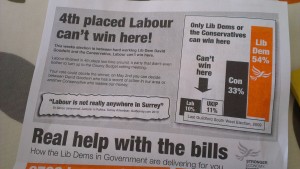It’s the start of May, so it’s local election time! While others celebrate workers or socialism, the British go out and vote for their councilors.
For me, that means a couple of things. Firstly, that I’m likely to be asked into the BBC Surrey studio to discuss ‘what it all means’ (tomorrow at 0705, since you ask). Secondly, that I get to consider more closely how local politics relates to the national and European arenas that are my usual habitat for research.
It’s worth saying that I have been drawn into the elections here in Surrey, as the LibDems took a comment I gave the local newspaper and slapped it on the back of their pamphlet. Within the day, a member of the Labour party had put this before me and explained that they were actually somewhere in Surrey, which was a fair enough point, although obviously not the one the LibDems were trying to make, nor one which the newspaper particularly elaborated upon.
That minor excitement (for me) aside, what has been telling is the way in which national parties have engaged with local politics. Over the past couple of decades, they have become increasingly interested in using local elections as a way of building leverage on the national stage. This has meant a big decline in the number of independents (although we do have some local exceptions), a rise in central party management of campaigning and party cohesion, as well as a strengthening of the second-orderness of these elections.
This last point is simply the (robust) model that says voters treat local elections as a vote on national politics (the first order), rather than the issues relevant to the local body. Thus, if we cast our mind over the campaigning, much of it has been about national issues, or at least generic ones. One of the reasons why the LibDems were as successful as they were in the 1990s and 2000s was that they saw the potential of building very local campaigns, which could then translate into a national one, and we still see traces of that. Likewise, UKIP has made much of the HS2 issue along its route, even though it has previously campaigned on a national platform of increasing the number of high-speed train lines. The anticipation in both cases has been that voters will not particularly notice discrepancies, and in that they are largely justified.
Despite this, national parties also seem to as concerned with the downside risks of these elections: you will have seen much about how the Tories will manage the losses that they are very likely to suffer. Even those parties likely to gain most (Labour) are not making too much of it either.
Rather than make an predictions – on which I’m likely to be wrong in any case (Nate Silver would argue that one) – I would simply encourage those who can, to go out and vote. It’s a lovely day for it, so go and exercise your democratic rights.

